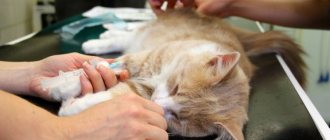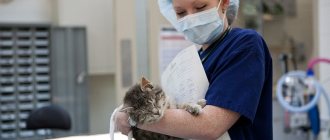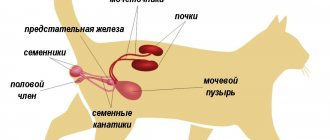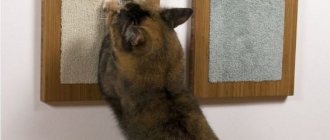What will you learn from the article?
- When to castrate a cat?
- Is it worth doing?
- How to prepare a cat for surgery?
- How does the operation take place?
- How to care for a cat after castration After local anesthesia
- After general anesthesia
- When to contact a veterinarian immediately
- Prices
By 6-8 months, cats reach sexual maturity, and the owners need to make an important decision - to castrate the cat or start looking for a bride for him. From the article you will learn what castration is, when it is performed, how to prepare a cat for it, what you need to know about this operation and the features of caring for pets after.
Castration of a cat is a surgical operation to remove the gonads from an animal.
After removing hair from the scrotum area, the doctor makes incisions, cuts off the spermatic cords, and removes the testes. The operation takes place under general anesthesia or local anesthesia.
When to castrate a cat?
At 6-12 months
According to veterinarians, the optimal age when cats can be castrated is from 6 to 12 months. At this age, the condition of the genital organs is ideal for surgery, and the influence of sex hormones on the animal is minimal. It is best to carry out the operation before the cat has time to “walk”.
What happens if you choose a different age?
If you castrate a cat too early, the animal's development may slow down. The level of sex hormones affects the rate of muscle growth. Early castrates can be smaller than their relatives and look like 10-month-old kittens until old age.
Castration too late (after 2-3 years) leads to the fact that the animal has already been formed under the influence of sex hormones and has certain habits. Therefore, after the operation the cat can continue to behave the same as before. The second disadvantage is that cats that were operated on late have a higher risk of developing obesity. Third, adult cats have a lower pain threshold, so the operation must be performed under anesthesia.
Recommended age for sterilization (castration) procedure
What time is castrated - the period from seven to nine months of life of a young British kitten is considered the most suitable for the operation (optimal age).
During the first six months of life, the cat grows vigorously, gains weight, builds up muscles, and the musculoskeletal system of the body develops and forms. Therefore, castration is not advisable before six to seven months. To be ripe for the procedure, a cat must cross a weight threshold of 1.5 - 2 kilograms. If the boy is a representative of a large cat breed (Kurilian Bobtail, Neva Masquerade), he can reach a weight of 3 kg a little earlier than 7 months.
Having reached the age of nine months, the cat turns into a sexually mature male. If you delay castration, the residual hormone levels will not go away immediately after the operation and the positive effects will manifest themselves with a delay.
Veterinarians recommend sterilizing a girl between the ages of 6 - 7 months (possibly earlier - at 4 - 5 months) to 9 - 10 years. It is not recommended to postpone the operation for a long time, since unsterilized cats that remain without mating increase the risk of diseases of the genital organs, which is not immediately clear.
Is it possible to castrate an adult British cat at 11, 12 - 13 years old? For older animals of both sexes, surgery is fraught with complications from anesthesia. Their castration should be approached with special responsibility. Preoperative preparation should include a full-scale diagnosis of internal organs (ultrasound, cardiogram, blood test for biochemistry).
Is it worth doing?
Pros:
- Change in behavior, lack of aggression;
- The cat stops marking his territory. Even if the instinct persists for some time after the operation (this is possible with late castration), the smell of urine becomes less pungent;
- The animal will not strive to leave its home - the risk that the cat will run away for a walk is reduced;
- The risk of developing malignant genital diseases is reduced several times.
Consequences (cons):
- The risk of the operation itself, performed under general anesthesia. To reduce it, do not neglect preparatory measures, carefully choose a clinic and veterinarian. Do not forget about a preliminary consultation with a veterinarian, choose modern anesthesia and procedure techniques.
- Risk of postoperative wound infection. Follow all doctor's recommendations, treat the wound, and prevent scratching and licking. If infected, contact your doctor immediately for treatment.
- Risk of pet obesity. After surgery, provide your cat with more active physical activity. Pay enough attention to your diet - reduce the serving size. After consulting with a veterinarian, switch the cat to specialized food for castrates.
Advantages and disadvantages
Castration has its pros and cons. The following arguments can be given in favor of the operation:
- the animal will be in a constant state of stress if the desire to mate is not satisfied;
- there is nothing good about taking birth control and hormonal pills throughout your pet’s life;
- there is a high risk of acquiring various diseases when a cat is sexually active;
- the animal will stop marking its territory after a few months;
- Fights between cats can injure, undermine health and even shorten the life of the animal. A neutered pet will not participate in fights, as it will be absolutely not interesting to him;
- such animals become very affectionate, flexible and easy to train;
How to prepare a cat for surgery?
The operation is dangerous for an animal with a weakened immune system, in the presence of diseases and during the recovery period. Therefore, the decision about castration surgery should be made after examination and consultation with a veterinarian. And the animal must be properly prepared for it.
Preparation for castration surgery:
- Preliminary inspection. It is carried out by a veterinarian to assess the general state of health and identify possible contraindications to the operation. As part of the examination, urine and stool samples are taken. In some cases: late castration, breed characteristics (British and Scottish cats), examination by a cardiologist, ultrasound of the heart and cardiogram will be required.
- Vaccination. The cat must have all necessary vaccinations and undergo a quarantine period (3-4 weeks).
- Anti-flea and anthelmintic treatment. 3 weeks before the proposed operation, the cat must be removed from fleas and worms.
- Anti-stress measures. In case of increased nervousness and excitability of the animal, the veterinarian prescribes sedatives 2-3 days before surgery.
- Laxatives. As prescribed by the doctor, a laxative is given 12-24 hours before surgery. So that immediately after the operation the animal does not have the urge to go to the toilet. This can negatively affect the healing of the wound and cause pain in your pet.
- Fasting and drinking regime. The animal is stopped feeding 12-16 hours before surgery. Access to water is stopped 3-4 hours before the procedure. If the cat's stomach is full, the anesthesia can cause a gag reflex - this is dangerous.
Video about preparing for surgery:
https://www.youtube.com/watch?v=88l0Q9o3nfg
Preparation period
The animal, instruments, and surgical field are prepared for the operation.
The animal is kept on a fasting diet for 10-12 hours, and kittens for 4-6 hours. Before surgery, the animal’s condition is examined, and special attention should be paid to:
- thickness of subcutaneous fat;
- condition of the dermis;
- body temperature;
- development and position of the testes;
- the presence or absence of a hernia;
- position of the spermatic cords;
- the presence or absence of inflammatory or infectious diseases.
How does the operation take place?
The first thing a doctor does in a clinic or at home is administer anesthesia. The veterinarian selects the type of anesthesia depending on the pet’s condition after examination and its age.
- Intravenous anesthesia. The most effective and safe anesthesia. It goes away quickly and is easily tolerated.
- Intramuscular. The classic method is affordable.
- Inhalation. Expensive and complex, practically never used.
After the animal is put under anesthesia, the veterinarian removes the hair and disinfects the surgical area. A longitudinal incision is made in the scrotum area with a sterile scalpel.
The doctor removes the testis from the scrotum and ties the spermatic cord with a self-absorbing thread to prevent bleeding. After this, the testis (testicle) is excised. In a similar way, the doctor repeats the procedure for the second testis (testicle).
The wound is dried with a sterile cloth and treated with an antibiotic-based spray. In veterinary medicine, two surgical technologies are used: with self-absorbing sutures and sutureless. After the wound heals, a small scar of 1.5-2 cm remains.
Video:
Procedure of castration, ovariohysterectomy
Castration of cats is carried out in order to stop the production of sex hormones until the reproductive instinct completely disappears. Castration can be done surgically or with medication. Surgery to remove testes from the scrotum or abdomen requires general anesthesia. The medical method consists of implanting a subcutaneous implant (Suprelorin) and is performed under local anesthesia. Both methods lead to the cessation of testosterone production, suppression of sexual instincts, and correction of the animal’s behavior.
For cats, castration (ovariohysterectomy) involves the removal of the internal genital organs: the uterus, ovaries, and fallopian tubes. The operation protects against uncontrolled mating and reduces the risk of reproductive cancers.
Photo - the genitourinary system of a cat
How to care for a cat after castration
The nature of postoperative care depends on what kind of anesthesia was used: local anesthesia or general anesthesia.
General requirements:
- After surgery, your cat will have chills. Prepare in advance a secluded, warm place to rest. Change the bedding to clean and ironed cotton fabric;
- Do not place the cat in a high place. It should be located on the floor. After surgery and anesthesia, the animal will have poor coordination of movements and may fall;
- Move the tray closer to the resting place to make it easier for the cat to get to it;
- Remove litter from the tray. The granules can injure or clog the wound. Instead of filler, you can use disposable pet diapers;
- If the cat does not go to the toilet in the litter tray, and this can happen, do not scold the animal;
- If the cat tries to lick a wound, use an Elizabethan collar.
After local anesthesia
After local anesthesia, the cat is conscious and all that is required from its owner is to treat the postoperative suture (if necessary) with special antiseptic agents, as well as thoroughly clean the litter box after each trip to the toilet. The animal may be inactive and look for a secluded place - if this lasts a short period of time after the operation, then there is no need to worry.
After general anesthesia
After general anesthesia, the cat will sleep for some time, and when it wakes up it will be weakened and disoriented. While the animal is recovering from anesthesia, it walks poorly, staggers and can easily injure itself - do not leave it unattended!
Do not force your cat to drink or forcefully offer food. The first meal can be 8-12 hours after surgery - the food should be light and in small quantities.
If your pet has a dry mouth, you can drop a couple of drops of water into the mouth to moisten the tongue. Do not force-feed copious amounts of water. The animal will drink on its own when it fully recovers from anesthesia.
When to contact a veterinarian immediately
- After castration, the pet does not eat for more than 2-3 days;
- On the first day after surgery, an increase in body temperature is observed;
- The cat has difficulty breathing, paleness or severe redness of the oral mucosa;
- Swelling has appeared.
A cat's recovery after surgery is much faster than that of a cat after sterilization. This is due to the fact that cats have a less invasive operation, i.e. requires a minimal area of intervention with a low degree of tissue trauma.
Video - care after surgery
Postoperative diet
After castration, cats' hormonal levels and the process of digesting food change. Neutered animals require 25–30% less energy, so it is necessary to reconsider the pet’s diet. It needs to be changed immediately after surgery.
Be sure to consult with your veterinarian regarding post-operative nutrition.
Cats compensate for the loss of sexual instinct with an increased craving for food. This can lead to obesity. Don't follow your cat's lead when he asks for more. Reduce the usual daily amount of feed by 25% and divide into several portions.
After surgery, cats need to be given special food.
If a cat does not eat properly, two problems can arise: obesity and urolithiasis. The narrowed urethra after castration interferes with the natural passage of stones. Products containing magnesium, calcium and phosphorus should be excluded from the diet. These substances cause the appearance of stones in the ureter. Remove fish from your diet. The basis of nutrition should be a vegetable and meat menu.
Components that cleanse urine of excess substances are contained in specialized food for neutered cats. Find the best food for your pet at your veterinary pharmacy.
What to do to prevent obesity
To avoid problems with excess weight, it is important to closely monitor your pet:
- Weigh the animal regularly. Make sure that the cat does not gain more than 20% of its previous weight. Obesity can lead not only to problems with urination, but also to the development of diabetes, so if your animal begins to gain extra pounds, be sure to consult a veterinarian.
After surgery, the cat's weight should not increase by more than 20%
- Find out your pet's energy needs. Remember that a low-active cat should consume no more than 60 kcal per day per 1 kg of live weight.
- Buy only high-quality feed. If an animal refuses food, fat reserves in the body begin to accumulate in the liver, which causes degenerative processes. Low-calorie food must have good taste in order to stimulate the animal's appetite.
- Play more outdoor games with your pet. Buy new interesting toys. The motto for a neutered cat: diet and exercise.
Games will help your cat stay fit
Regular dry cat food is not recommended; it contains added by-products, sugar substitutes and preservatives.
Complications after surgery
The reaction to surgery is individual for each animal. After castration surgery for a kitten, the following complications are possible:
- Vomit. Typical reaction to anesthesia. If the cat vomits once and not profusely, make sure that the animal does not choke in the vomit. Turn the cat's head to the side. If vomiting is severe and uncontrollable, immediately inform the doctor who performed the operation.
- Hyperthermia. Fever, drowsiness and weakness are a normal reaction of the animal to surgery and anesthesia. This condition occurs in all cats in the first postoperative hours and can last up to 2 days. If the animal's body temperature is above 39°C and lasts more than 1-2 days after surgery, contact your veterinarian.
- Refusal to eat, lack of appetite. Fasting on the first day after surgery is normal.
- Reduced temperature. If the animal's body temperature drops below 37°C, cover it with warm heating pads. If this does not help, urgent medical attention is needed.
- Infection of a postoperative wound. Slight redness or swelling is allowed in the first 3-4 days after castration. If redness or discharge from the wound increases, you should seek help from a veterinarian.
- Inflammation of the stump of the spermatic cord. It can develop in cats in the first week after surgery. This is indicated by: lethargy, painful swelling at the operation site and an increase in the cat’s body temperature.
- Internal hemorrhage. You should be alert to: weakness and lethargy of the cat, drowsiness, pale oral mucosa (white). Each touch to the animal will cause a painful reaction in it. You cannot do without the help of a veterinarian.
- Obesity. Changes in the animal's hormonal levels after surgery cause metabolic disorders. He slows down. Possible weight gain. Do not overfeed your cat and create a balanced diet.
Important!
Stay close to your cat after surgery and contact your veterinarian if any suspicious symptoms occur.
Experience of mass castration and sterilization of stray animals
Volunteer practice in many cities shows that there should be no serious consequences after castration.
After all, it is mainly adult, sexually mature animals that are castrated, limiting the increase in the street population. Many veterinarians associated with volunteers primarily engage in castration and sterilization, as they say, on-line. All cats and cats operated by them successfully recover from anesthesia and either return to their usual environment or are sent to foster care with subsequent placement.
What is the price
Russia
- Moscow and St. Petersburg – 1000 – 3000 rubles;
- Regions of Russia – 850 – 2500 rub.
Ukraine
- Kyiv – 350 – 900 hryvnia;
- Regions of Ukraine – 250 – 500 UAH;
Be careful when choosing a clinic. If a small and attractive price is indicated, it is quite possible that this is a marketing ploy with which they are trying to lure you.
A suspiciously low price for castration indicates that you may be additionally billed for anesthesia, medications and consumables. Take the time to find out everything in detail before you sign up for the operation.
Is it worth castrating a cat at home?
If you do not want to take your pet to the clinic or are unable to do so, consider having neutering surgery at home.
Features of preparing and performing surgery at home
- The animal is prepared in the same way as for an operation that is performed in a hospital setting;
- You need to prepare a clean room. A bathroom that is washed using household disinfectants, dried and ventilated is best suited. It is impossible to achieve sterility at home, but it is not necessary. Castration is not an abdominal operation;
- A table for surgical procedures is installed in the prepared room. It is also disinfected.
Pros:
- Saving time on transporting the animal to the clinic;
- The animal does not experience stress from transportation;
- After the operation, the cat is in a familiar environment, he recovers faster;
- There is no risk of infection from other animals.
Minuses:
- Inability to achieve sterility;
- There is no equipment for resuscitation measures. It may be needed if the animal has an individual negative reaction to anesthesia or medications;
- Calling a specialist to your home is more expensive and may depend on the distance of the house from the clinic.
Prices
Russia
- Moscow and St. Petersburg – 2200 – 3000 rubles;
- Regions of Russia – 1500 – 2500 rubles.
Ukraine
- Kyiv – 500 – 900 hryvnia;
- Regions of Ukraine – 400 – 500 UAH;
Contraindications to castration
Anesthesia is always stressful for the body. The heart, kidneys and liver begin to work hard to remove toxins and get rid of the effects of anesthesia. The condition of these organs determines whether adult cats can be castrated.
Contraindications for testicular removal are:
- heart failure;
- vascular diseases;
- the presence of infection and inflammatory process;
- epilepsy;
- severe pathologies of internal organs;
- diabetes;
- underweight;
- urolithiasis disease;
- allergy to anesthetics.
If the animal has one or more of the above contraindications, you will have to look for an alternative to castration. Otherwise, the possible consequences may be fatal.
After examining the cat, performing diagnostic procedures and taking all the necessary tests, the veterinarian will tell you whether the operation can be performed. The animal owner’s task is to listen carefully to the doctor and do as he says. This is the key to a healthy and long life for your pet.
Alternative methods of castration
Modern veterinary medicine also knows other methods of castration (sterilization) of cats. They are used as an alternative to surgery, but not as often as the classic method.
- Vasectomy (sterilization). It involves ligating the vas deferens. The cat loses the ability to have offspring, but does not lose the ability to mate. The operation is complex and expensive.
- Radiation sterilization. Targeted irradiation of the cat's reproductive organs (testicles). The method is rare, expensive, and requires special high-tech equipment.
- Temporary chemical castration. An implant containing a substance that suppresses the animal’s sexual desire is inserted under the animal’s skin. Expensive way.
- Hormonal temporary sterilization. Once every six months, the animal is given a hormonal injection that suppresses sexual desire. This manipulation is carried out for life.
Important!
All methods can be used to castrate a kitten, but surgery is considered the most effective and safest today.
Whether or not to castrate your cat is up to you to decide. But remember that not only we humans should live comfortably, but also our pets for whom we are responsible.











